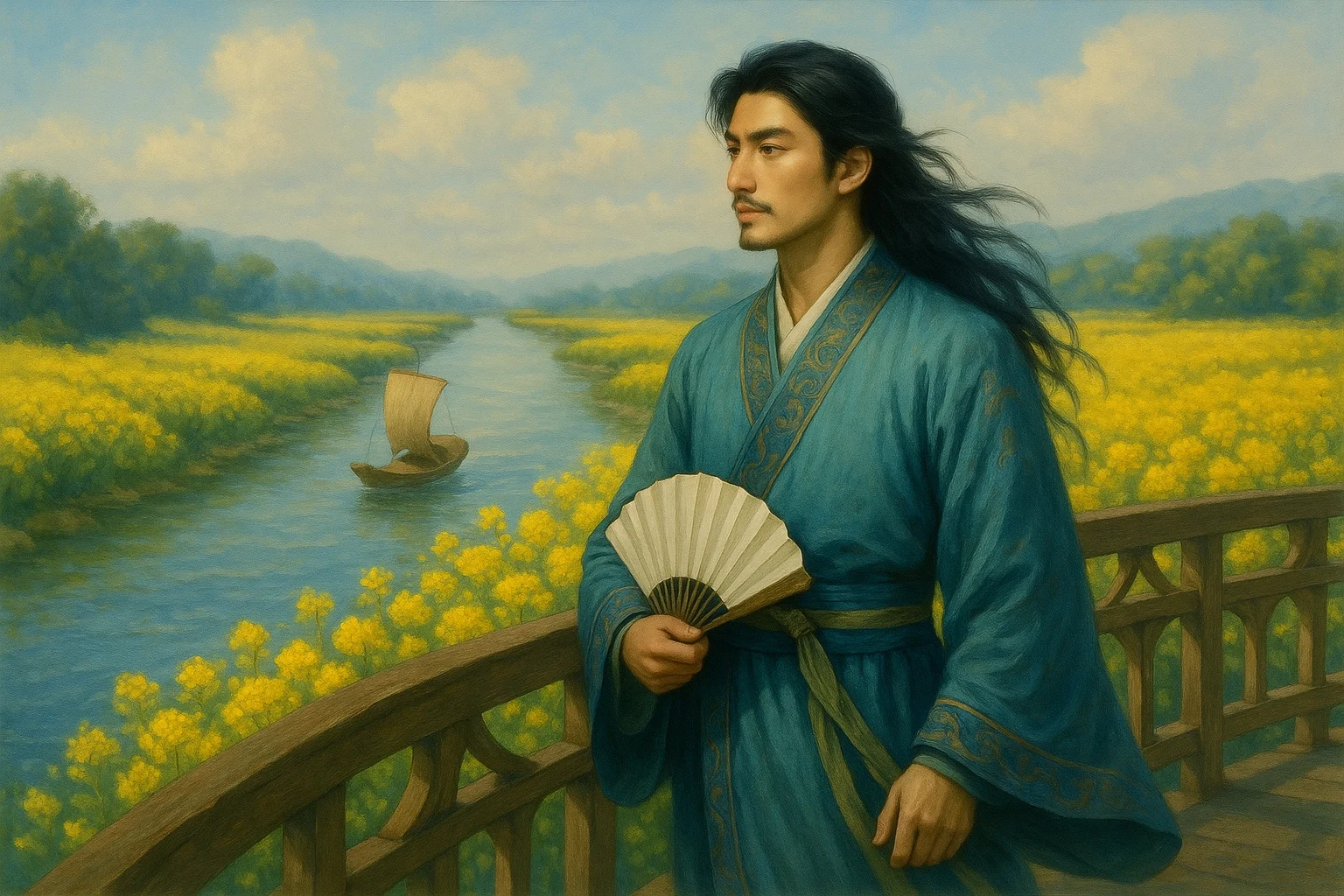From eastern Chu to western Qin I roam,
A drifting cloud, with no true home.
Through border hills, I urge my weary steed,
While servants seek their shelter where they can.
A thousand miles alone I’ve come this way,
My household left in strangers’ kindly care.
My fate—uncertain as the winds at night—
At midnight, I ask: do loved ones still remember me there?
Original Poem
「客舍书情寄赵中丞」
崔峒
东楚复西秦,浮云类此身。
关山劳策蹇,僮仆惯投人。
孤客来千里,全家托四邻。
生涯难自料,中夜问情亲。
Interpretation
This poem was written by Cui Dong during his wanderings, while staying at an inn far from home—a lyrical missive addressed to his friend Zhao, who then held the prestigious position of Censor (御史中丞). Though talented, Cui Dong found no success in officialdom; adrift and alone in a foreign place, he poured his rootless existence and sleepless midnight worries into these lines. The poem expresses longing for old friends and resignation to reality, mingling hope with lament.
First Couplet: "东楚复西秦,浮云类此身。"
Dōng Chǔ fù Xī Qín, fú yún lèi cǐ shēn.
From eastern Chu to western Qin—
My life drifts like a vagrant cloud.
The opening spans vast geography (eastern Chu, western Qin), mapping the poet’s restless journey. The vagrant cloud (浮云) becomes a metaphor for his unsettled fate, its aimless motion reflecting life’s unpredictability. The couplet casts the shadow of exile from the very first breath.
Second Couplet: "关山劳策蹇,僮仆惯投人。"
Guān shān láo cè jiǎn, tóng pú guàn tóu rén.
Through mountain passes, my lame donkey plods;
Even my servants know to beg alms now.
Here, hardship takes tangible form: the lame donkey (蹇) embodies weary struggle, while servants begging (僮仆投人) exposes the family’s humiliating reliance on others. The image of servants grown accustomed to charity underscores their prolonged destitution—a silent indictment of the poet’s failed career.
Third Couplet: "孤客来千里,全家托四邻。"
Gū kè lái qiān lǐ, quán jiā tuō sì lín.
A lone traveler from a thousand miles,
My whole household leans on neighbors’ mercy.
The focus expands from self to family. Lone traveler (孤客) echoes his isolation, while leans on neighbors (托四邻) reveals the precariousness of those left behind. The juxtaposition of his solitary journey and his family’s dependence amplifies the poem’s emotional weight.
Fourth Couplet: "生涯难自料,中夜问情亲。"
Shēng yá nán zì liào, zhōng yè wèn qíng qīn.
No man can foresee his own fate—
At midnight, I whisper to absent kin.
The finale turns inward. No man can foresee (难自料) admits life’s cruel uncertainty, while whisper to absent kin (问情亲) lays bare his nocturnal grief. The unanswered “question” hangs in the dark, a poignant close to this chronicle of displacement.
Holistic Appreciation
The poem employs plain language and sincere emotion to depict the plight of a displaced scholar seeking aid, vividly portraying the rootless existence and inner turmoil of a down-and-out literatus. The poet compares himself to "a drifting cloud," symbolizing the helpless rootlessness of his life; he describes his exhausted donkey and weary social efforts, alone in a foreign land with no support for his family—every aspect of his existence constrained. The closing line, with its image of "midnight," captures the most unbearable moment of solitude—sleepless and longing for home—with profound emotional power.
Though addressed to Vice Director Zhao, the poem does not directly plead for assistance. Instead, through plainspoken narration and poetic evocation, it invites readers to empathize with the poet's predicament, thereby eliciting compassion and aid. This restrained yet deeply moving expression of emotion maintains dignity while conveying poignant sorrow.
Artistic Merits
The poem is marked by unadorned language and profound sincerity, skillfully using everyday details to convey life's hardships and the ache of displacement. The poet deftly employs concrete imagery—"drifting cloud," "urging his stumbling donkey," "neighbors on all sides"—to paint a vivid picture of his itinerant struggles. Narration and lyricism merge seamlessly, with emotion conveyed subtly yet powerfully. The structure is polished, the phrasing lucid, embodying both the classical elegance of Tang regulated verse and Cui Dong's signature restrained tone.
Insights
This poem reminds us: in times of hardship, loneliness and yearning for kinship grow acute, yet true expression lies not in vehement words but in natural emotional revelation. Cui Dong's plainspoken verses articulate universal human feelings, allowing us to witness an ancient scholar's dignified resignation in adversity while recognizing the priceless value of friendship and family when life grows difficult.
About the Poet

Cui Dong (崔峒, dates of birth and death unknown), a Tang Dynasty poet from Anping, Hebei, was active during the Dali era (766 - 779). Along with Sikong Shu, Lu Lun and others, he was known as one of the "Ten Talents of Dali." His poetry primarily consists of five-character regulated verse (wulü), characterized by an elegant and subtle style. The Complete Tang Poems preserves 48 of his works. His poetic style resembles Liu Changqing's but appears more solitary and austere, reflecting the transition from the vigorous grandeur of High Tang poetry to the introspective quality of Dali-era verse.












